How did Odessa's fire happen?
- Published
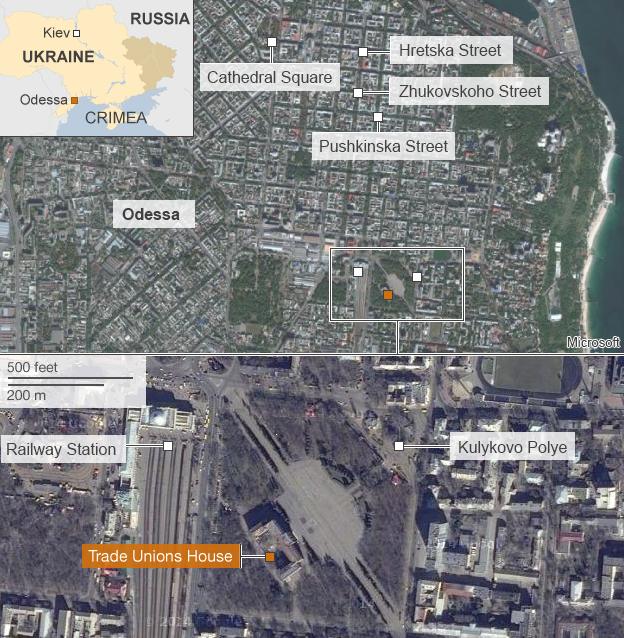
Forty-two people trapped by a fire on the third floor of the stately, Soviet-era Trades Unions building burned, suffocated or jumped to their deaths. How did the victims come to be in the building and who started the fire?
The violence erupted as fans marching before a football match were ambushed by pro-Russian activists, eyewitnesses say.
Local side Chornomorets were playing Metalist Kharkiv.
Hardline fans - known as "ultras" - of both teams agreed to hold a joint march to support a united Ukraine.
The group gathered at about 14:00 in Cathedral Square. Some were veteran supporters of Kiev's Maidan protest movement - the Maidan Self Defence Forces - and/or part of the right-wing Pravy Sektor (Right Sector). But eyewitness accounts and videos suggest that many were just ordinary members of the public.
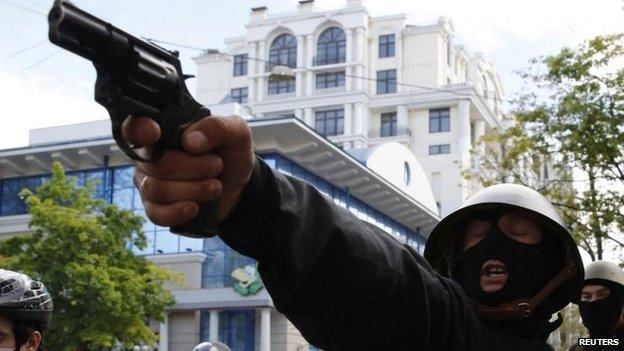
Some pro-Russian activists carried guns and fired shots during the rioting
The marchers may have suspected trouble in a city with an ethnic Russian minority of around 30%.
But as Chornomorets supporter Nadiya Yashan told Ukrainian television: "We never expected an ambush on such a scale and the police to do so little."
Tensions were already running high in Odessa because pro-Russian opponents of the Maidan had been camping in a central square - Kulykove Pole - since the February protests which ousted President Viktor Yanukovych in Kiev.
Only days before the Odessa violence, in the eastern city of Donetsk, armed pro-Russian militants had attacked a peaceful pro-Maidan march.
Some of the pro-Ukrainian marchers' rivals in Odessa were wearing orange and black stripes on their clothing - the so-called Ribbon of St George, one of the most recognised symbols of military valour in Russia. The ribbon is now an emblem worn by pro-Russian separatists in eastern Ukraine.
Bogdan, who was part of the fans' march, told the BBC: "People started to walk, they were attacked by these guys in army helmets with baseball bats. Some of them had guns."
The clashes appeared to begin on Grecheskaya/Hretska (Greek) Street.
A video on YouTube , externalpurporting to show the start of the violence suggests that police stood by as pro-Russian activists armed themselves with batons and other weapons.
The same video also shows many pro-Ukrainian marchers later smashing paving stones and hurling them at the pro-Russian crowd.
Eyewitness Serhiy told the BBC he saw a newsflash on TV at 15:50 local time about clashes there and went to the scene.
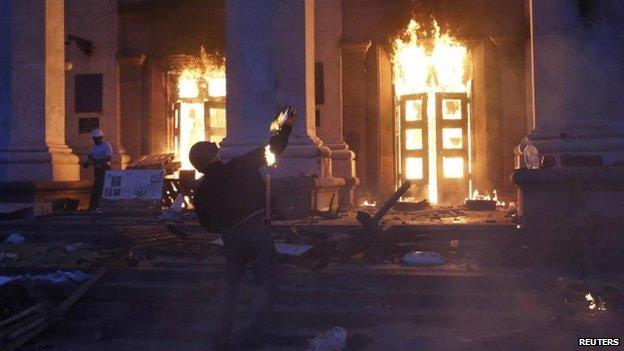
Petrol bombs were thrown at those inside the building but did they start the third floor fire?
"It wasn't like close, hand-to-hand combat. It was mostly throwing of pavement blocks by both sides," he said.
Other reports suggested some of the activists on both sides were well-armed and well-protected - clubs, metal bars, air pistols, baseball bats and body armour, shields and helmets.
An amateur YouTube video appears to show a line of riot police shielding pro-Russian activists, one of whom fires a gun , externalwhile chunks of paving stone rain down from the crowd on the other side.
A number of reports also spoke of armed protesters using the rooftop of the Afina shopping centre to fire pistols and throw Molotov cocktails.
There seems little doubt that the gunshots - and reports of casualties - fuelled the anger of the pro-Ukrainian crowd.
Serhiy spoke of a "see-saw battle" of about 15 minutes, before the "pro-separatists" started to withdraw.
Police said at least three people were shot dead in the running battles before the deadly fire at the Trade Unions House.
Over the next few hours the clashes fragmented but a key development appeared to be a move by pro-Ukrainians against the tent city in Kulykovo Pole square.
Serhiy said: "People started streaming toward the station, taking Zhukovskoho Street and then taking Pushkinska Street. They chanted 'Long live Ukraine!' and 'Odessa is Ukrainian!'."
He said tents in the pro-Russian camp were burning when he arrived and those there had moved to the entrance of the nearby Trade Unions House.
"Eventually, they were driven in," he said.
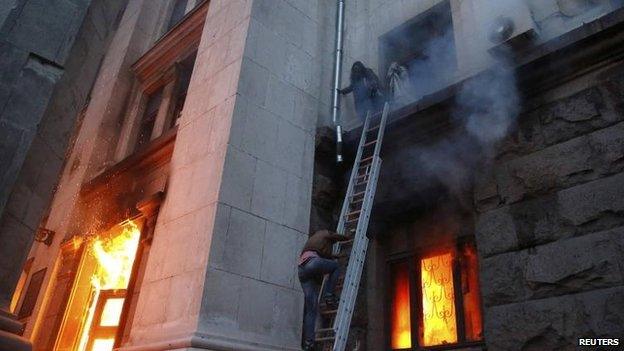
Some were rescued from the union building by ladders but others fell to their death
By his estimate there were several thousand football fans and about 300 pro-Russians.
There was hand-to-hand fighting in the building although, again, it appeared the police did little to intervene.
Television pictures and reports suggest both sides were throwing Molotov cocktails.
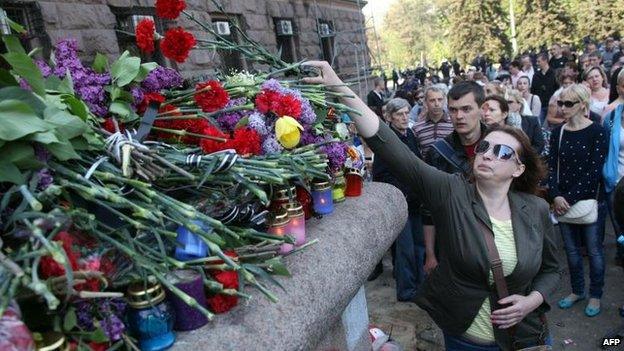
Flowers are brought to the building to remember the dead
Pro-Ukrainians reported that the pro-Russians were armed and firing pistols and rifles from the upper floors.
Russia Today carried video of a man in a bulletproof vest who it said was shooting up at people in the burning building. But the video was later no longer available.
It remains unclear how the fire started on the third floor.
Pictures clearly showed pro-Ukrainians throwing Molotov cocktails towards the floor.
But Serhiy said he saw someone "on the third floor throw a Molotov cocktail through the closed window. However, the glass didn't break and a fire started inside".
People struggled to get out of the smoke-filled floor.
One survivor told Russia Today: "We couldn't go down, we were seeing people from other floors being brought down and then those rioters down there attacked them like a pack of wolves."
But other eyewitness reports, for example in the Kyiv Post,, external said pro-Ukrainian activists rescued dozens of people from the burning building.
Some people got to ledges and were helped by ambulance ladders. Some fell.
Some people were reported to have shouted "die" as people fell.
One of those who had been at the building, Anatoly, said the people inside were not "pro-Russian activists".
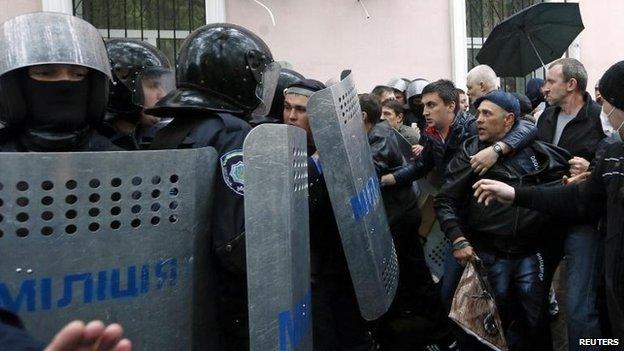
Anger over the deaths sparked a rally at the police HQ on Sunday
He told the BBC: "We are from Odessa. It's just about Odessa, about peace. It was horror. It was annihilation of people believed to be separatists. But I am not separatist, I was born in Odessa."
Over the next 48 hours, there appeared to be some respite - both sides bringing flowers to honour the dead.
In the aftermath, Ukraine's Prime Minister Arseniy Yatsenyuk had some angry words for the security forces, saying they were "inefficient and they violated the law".
He promised a full investigation - right down to "every single police officer". He also said international experts would help to get to the truth of what happened, to make the inquiry transparent.
The failings of the security forces appear to be one of the few things people agree on.